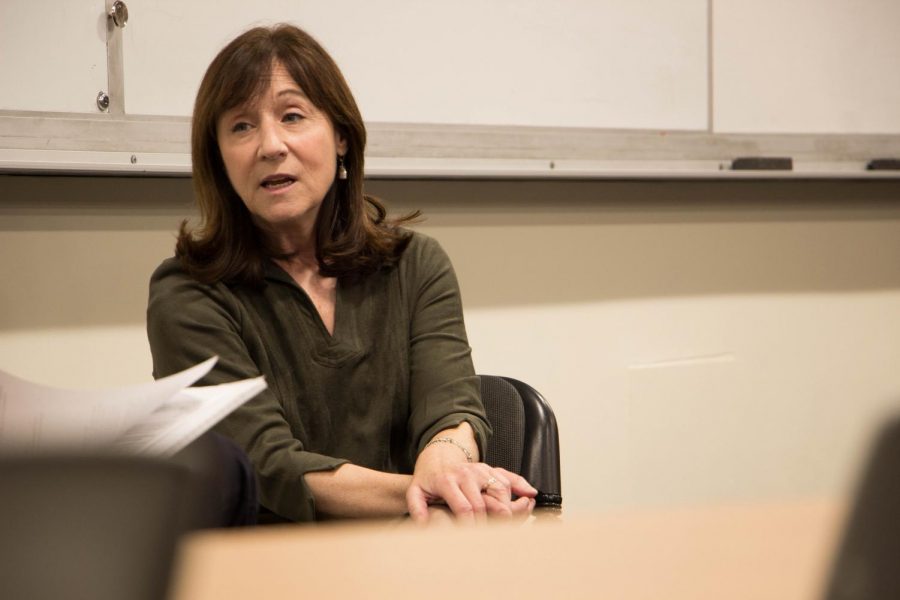New Yorker journalist visits campus
November 1, 2018
Speaking with English Professor Greg Bottoms and fielding questions from the crowd in Lafayette Hall, political journalist Jane Mayer visited the University of Vermont Thursday, Oct. 25, where she offered an insider’s perspective into the modern media.
Mayer is a staff writer for the New Yorker and an author of several books, including Dark Money: The Hidden History of the Billionaires Behind the Radical Right, in which she chronicles the political impacts of financial contributions from the billionaire brothers Charles and David Koch, as well as other donors.
Through her work, she has built herself a reputation as one of the preeminent political journalists working today. As a result, she has faced attacks from some of the country’s most powerful players.
When Mayer began to write about the Koch brothers for a 2010 New Yorker article, they hired a private eye who tried to publish stories falsely accusing Mayer of plagiarism, which she was able to quash before they went to print, she said.
“They attacked me…in a way I had never been attacked before,” Mayer said.
At the same time that powerful people have attempted to obstruct reporting, and Donald Trump has manipulated the media to advance his agenda, people have become more fearful of speaking to the press, Mayer said. Government officials often opt to speak anonymously for fear of retaliation, she said.
“It’s gotten…what I think is kind of un-American,” Mayer said, drawing comparisons to the fall of the Berlin Wall, when reporters had to devise elaborate way to contact sources, who were scared they would be seen cooperating with the media.
In his introduction to Mayer’s speech, President Tom Sullivan noted that these threats to a free press make Mayer’s work more valuable than ever. They also make clear the importance of training future journalists, he said.
The Department of Community Development and Applied Economics introduced a new concentration this semester of community journalism, which teaches students to report on a small, tight knit population.
The College of Arts and Sciences, meanwhile has rolled out a new major titled Reporting and Documentary Storytelling, which is aimed at teaching budding journalists how to shape their facts into a compelling narrative in multiple mediums, Sullivan said.
Despite the alarming political environment Mayer described, Sophomore Katie Rearden, an Environmental Studies and German major, found comfort in knowing that the upper-echelons of reporting are comprised of people as competent and personable as Mayer, she said.
“It made me kind of hopeful…to hear that there are people out there making sense of what’s going on in the world,” Reardon said.
Like Rearden, who is an intern at VT Digger, Mayer got her start in journalism working in Vermont. Mayer’s first foray into reporting was at the Weathersfield Weekly, though her career really launched when she moved to the Rutland Herald, she said.
“My job was about as unglamorous I think as journalism can be,” she said. Assigned to hospital news beat, Mayer had to drive by the hospital every morning to pick up a list of who was born and who was admitted.
“With that I learned that you had to spell people’s names right, and there are facts that actually exist in the world,” she said.
Rearden found it encouraging that Mayer had sharpened her skills in Vermont, which allowed her to improve upon mistakes made in front of a relatively small audience, she said.
“That was in a way comforting…and kind of inspiring, cause she’s obviously come so far,” Rearden said.
While Mayer’s job and the political arena in which she works has changed immensely since those daily drives by the hospital, she feels as devoted to her work as ever, she said.
“It’s been really a fun job to do, and also something that feels really meaningful,” she said. “It’s really hard for democracy to work when nobody knows what information is true,” she said.







